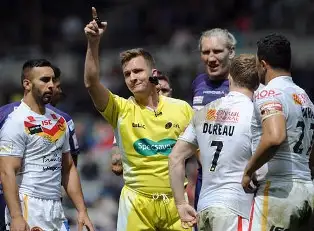Refereeing styles show rugby’s cultural divide

Much is made of the class and cultural divisions between rugby league and rugby union, but perhaps the most succinct expression of those differences can be seen in the way the two codes are refereed.
With the Six Nations kicking off in rugby union this weekend, we are likely to see a lot of their most famous referee Nigel Owens on the telly over the next few weeks.
Owens is hailed as the best of that code’s officials, at least by people in the Northern Hemisphere.
The Welshman is famed for the way he talks to players, addressing them in the dismissive, and often downright patronising, tones of a schoolmaster (not a teacher, note) at the kind of private institution which favours the union game.
Whilst armchair fans everywhere delight in players being told off like children on the naughty step, I doubt whether many professional union players see Owens in such a glowing light.
Being spoken to like that would not go down well in rugby league.
Super League referee Ben Thaler adopts a different approach to Owens, and, in its way, it encapsulates the different class origins of our sport.
“I don’t understand his Welsh accent!” Thaler joked to Love Rugby League about Owens recently.
“But what does works for him in his sport, and a lot of the rugby union lads seem to like that.
“If we spoke to our players in rugby league like that, some of them would say, ‘Eh? What?’, and I’m not sure I could put the voice on for that long!
“You are who you are, in the way that you work.
“My way of doing it is that I know that I can manage those players to the best of my ability, by giving them a fair crack, by being consistent in the way I apply the laws, speak, communicate, encourage, discipline.
“If that’s consistent, and both teams see that they’re getting a fair crack, and I’m trying to give them as much help as possible, then it does work.”
Rugby league was not refined on the playing fields of the English public (sic) schools, but on fields set amidst mines, docks and factories.
We still retain a strong cultural legacy from the days when the North of England was still industrial, and from the fact that we broke away from the Establishment.
We are chippy, democratic, believe in plain speaking, and know that respect is earned rather than given freely, simply because someone has a title or a particular job.
Our referees speak to players like colleagues, not pupils, and long may it continue.